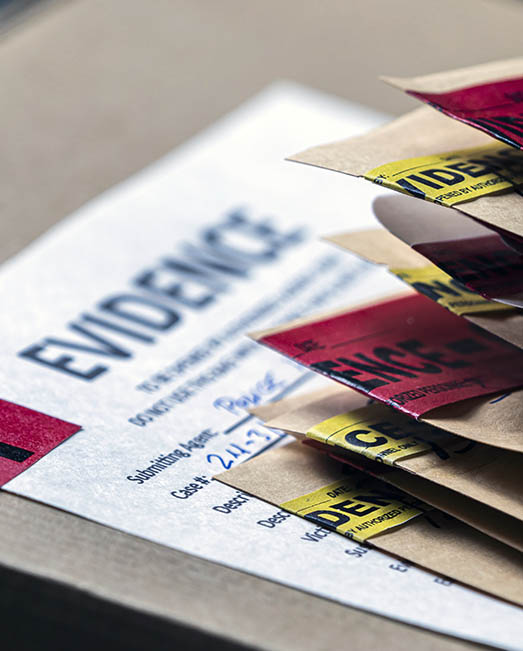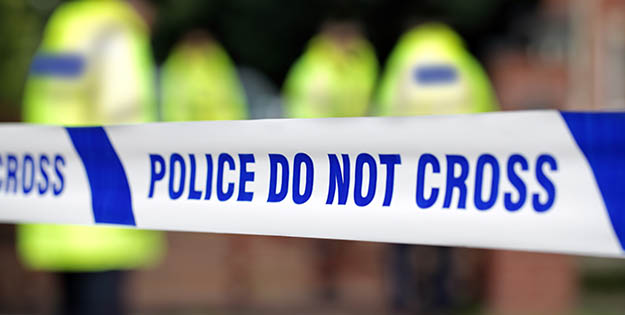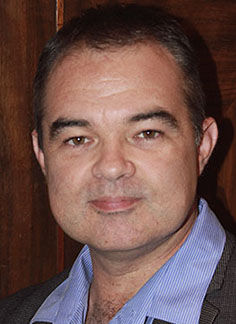Future student
Copyright@ Australian Catholic University 1998-2026 | ABN 15 050 192 660 CRICOS registered provider: 00004G | PRV12008
Copyright@ Australian Catholic University 1998-2026 | ABN 15 050 192 660 CRICOS registered provider: 00004G | PRV12008

When it comes to crime television, many of us fall victim to the allure of watching lawyers and detectives shine a light on the darker aspects of humanity on the small screen.
While sitting there engrossed in these crime thrillers and courtroom dramas, it can be easy to forget they tend to paint a distorted picture of the world of crime and justice.
The reality is no less interesting – a career in the criminal justice sector can be both fascinating and rewarding – but it rarely provides the type of material that makes for good viewing.
“The bulk of trial work takes place behind the scenes,” says Dr Brendon Murphy, a criminal law expert and senior lecturer at ACU’s Thomas More Law School. “It doesn’t make good television.”
That said, there is undoubtedly a magnetism to the field of criminal justice. In recent years, the interest in this area of study and practice has grown, as people are increasingly drawn towards the endeavour of understanding why people commit crimes, and how society can respond to it.
“It’s an opportunity to understand the nature of right and wrong, the mechanics of power, and the scope of human frailty,” says Dr Murphy, whose research work focuses on criminal law, policing and the intersection of law and social theory.
“It’s also a study in evidence-based logic and inferential reasoning as we strive to not only enforce the law and prevent crime, but also to improve standards of living.”
So, what is criminology and criminal law? And why does the world need lawyers, detectives and other criminal justice professionals?
We sat down with Dr Murphy, an experienced legal practitioner and academic, to delve into the world of crime and justice.
“Criminal law and crime are important teachers about humanity. The study of crime and law offers insights into all kinds of aspects of human behaviour; the good, the bad and the ugly. We learn a lot about crime’s opposites – the value and limits of compassion, the importance of kindness, the meaning of trust, and the critical role of truth. So for me, the study of crime is linked to moral and ethical philosophy. But in addition to that, I am a scholar interested in knowledge systems, and how those systems construct the world and our lives, and especially how those systems express power. So, in a way, I am really interested in what’s behind the rules and actions constituting crime.”
“The study of criminal law and criminology captures a wide range of topics, ranging from the actual laws that prohibit and regulate behaviours, the institutions that investigate and enforce the law, and the darker aspect of humanity. But it’s much more than that; it’s a study of human nature, psychology, values, power and politics. What a society will punish and the way it does it says a lot about that society.
It would be great if we did not need criminal lawyers or criminologists; but sadly, we do, and I see little reason to believe that will change anytime soon. At the very least, frontline workers in criminal law are needed to prosecute and defend matters brought before courts, where each of them have vital roles to play. One fairly represents the community in the prosecution of crime; the other ensures the accused is competently defended.”
“Technology is presenting new ways of both preventing and investigating crime, but it also is offering new ways of committing crimes. I can give three recent examples. The first is the practice of taking images and videos of sexual activity. Sometimes this happens consensually, but often it happens without consent. These images can then be shared, and sometimes uploaded onto websites. The damage that does to people’s reputation and sense of self is enormous, especially now that images on the internet are virtually permanent. So, we’re talking about lifelong shame. It can destroy a person’s career.

Another example is the advent of cryptocurrency. Cryptocurrency is one of those things that invites currency speculation, but is particularly used in money-laundering and fraud, and not infrequently used for hiding assets in family law disputes.
And finally, we now live in a society in which all of us live under perpetual, global surveillance, with real-time tracking of almost every aspect of life. Ironically, most of the information about us is held by private organisations rather than state institutions. Facebook, for example, has managed to create a database about people in 10 years that neither the CIA nor the KGB was able to do in 50. All of these things raise profoundly important questions about how to regulate technology, and the proper limits of the uses of technology.”
“One of the problems with law is the assumption that criminal law stops things from happening. It doesn’t. Law does have a deterrent effect, but criminal law is mainly retroactive. One of the real challenges with technology is the speed and general invisibility of it happening. Money laundering, for example, is very hard to prevent, hard to track once it happens, and potentially involves the movement of vast sums of money. But the good news is that just as technology enables crime, it also enables the investigator. There is always evidence left behind.”
“It’s a combination of things, really. Because law is dynamic, you have to refresh your lecture material each time you run a course. That’s an ordinary part of good academic practice. It’s time-consuming, but important to do. In addition to that, I keep an eye on the news and what’s happening in the courts. I listen to practitioners who keep me informed about matters coming to them. But the other thing I do is listen to my students. Because crime is such an interesting topic, students are fabulous sources of information about what they have seen and heard, and I try to have an ongoing dialogue with them about current issues. You need to be ‘reflexive’ if I can use that expression.
“They play a vital role in the investigation and evidence gathering phase of the system. One cutting-edge issue is the use of technologies that can copy a person’s mobile phone. That capacity provides enormous value in intelligence and evidence gathering, but at the same time, it is invasive. So here there are important legal and public policy issues that are evolving right now. For example, if the messaging on your phone is copied, it might reveal all of the communication between you and everyone in your network. But what if that includes your lawyer? Are those communications privileged? Does that mean everything is inadmissible? Or only those texts? Technology is causing important developments in law and criminal justice all the time.
“It is true that people commit all manner of crimes, and many of these are things that you find personally objectionable. There are cases that I have read as part of my work that I have to put down and walk away from, even now. Some crimes are horrific.
What you are asking is a common issue for those who represent the guilty. And yes, part of being a professional is about suspending personal views and focusing on the process. On that front, solicitors and barristers are guided by professional conduct rules, and these need to be front and centre in the mind of defence lawyers. Where a person confesses guilt but maintains a not guilty plea, there are strict rules about how the case is conducted. A person is entitled to test the prosecution evidence, and the law being applied, but cannot falsely implicate others, for example. But a person should normally be advised of the value of a guilty plea. At the very least, it can reduce any sentence the person might face. But we have to remember that sometimes what has been alleged is not as simple as it sounds. Sometimes events happen really quickly, and what one person thought and did might be misinterpreted by others. Life is complex.
The other thing to remember is often people who commit crimes have had appalling lives. There are rarely people who are truly wicked – but they’re out there. Most offenders have dreadful personal histories. They’re often victims themselves, and often profoundly sorry for what has happened. That does not excuse them, of course, but it does help understand them. So for me, it’s about thinking through the whole picture – the event, the victim and the offender. So, how should criminal lawyers deal with the tension? Maintain professionalism, which includes looking after your own mental health.”
“It really depends on the show, but most of the time they distort the reality. In local courts, for example, the vast number of cases involve guilty pleas. People are arrested or summoned for things they have actually done and are guilty of. Many of them are unrepresented. In a busy court there might be a hundred cases or more in a day. Preparation time can be limited. At this level, there is no room for Atticus Finch and clever arguments on law. If matters go to trial, it will take months of preparation work and pre-trial hearings. Again, there are rarely arguments involving law – much of the attention is on the evidence.
One of the common misconceptions is the idea of barristers walking around the courtroom – which doesn’t happen. And as much as I am a fan of Rake, if a barrister behaved like Cleaver Greene in court, I doubt their career would last very long. Having said that, some bizarre things happen in courts at times. But for the most part, courts are busy places, staffed by professional people who take their work seriously.
Personally, I like a good legal drama, and enjoy a good laugh – especially those farcical things that come before courts at times. Cleaver Greene is a favourite. I guess a lot depends on how things are being portrayed. As long as people watch these things knowing it’s entertainment and not accurate, then I suppose there is no harm in that.”
Dr Brendon Murphy is a Senior Lecturer at ACU’s Thomas More Law School. Before joining the academy in 2007, he worked as in-house solicitor for the University of Newcastle, and in litigation after being admitted as a legal practitioner in the NSW Supreme Court.

His research work straddles criminal law and procedure, investigations law and regulation, research methodology, policing and the intersection of law and social theory. His PhD was recently published as Regulating Undercover Law Enforcement: The Australian Experience by Springer International.
Keen to pursue a career in criminology and criminal justice? Explore ACU’s Bachelor of Criminology and Criminal Justice.
Copyright@ Australian Catholic University 1998-2026 | ABN 15 050 192 660 CRICOS registered provider: 00004G | PRV12008